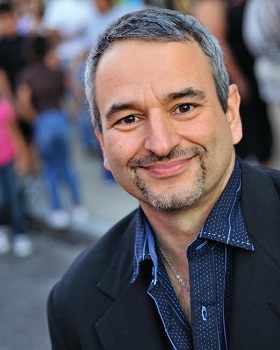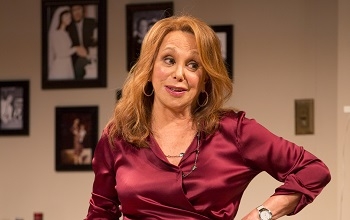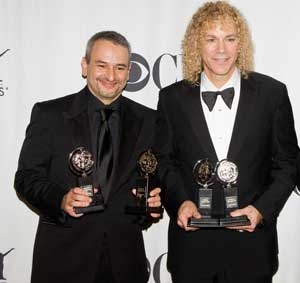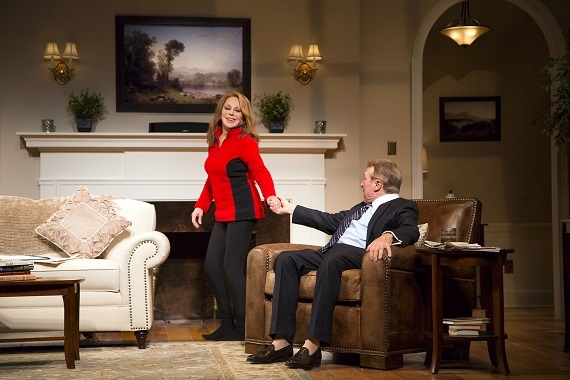Joe DiPietro’s Career Beyond Broadway

(© Andrea Zucker Photography)
Tony Award winner Joe DiPietro may be best known as book writer of the musicals Memphis, Nice Work If You Can Get It, The Toxic Avenger, and I Love You, You’re Perfect, Now Change. But he also has a growing body of nonmusical work, both comedic and dramatic, being produced around the country.
TheaterMania spoke with DiPietro about the world premiere of his play Clever Little Lies, starring Marlo Thomas, with frequent collaborator George Street Playhouse, as well as his path to script-writing, and what it takes for him to say yes to a project.
This is your third show now with George Street Playhouse, after The Toxic Avenger and Creating Claire. How did this relationship start, and what keeps you going back?
I went to Rutgers University, so I was well aware of George Street, and was a big fan, though I had never met [Artistic Director] David Saint. I thought Toxic might be perfect for George Street, given the New Jersey connection. So we sent it to David, and almost right away he called and said, “This is the funniest musical I have ever read. I have to do this.” Anyone who knows the way most artistic directors work, you have to do several readings, there’s development, you have to go through all sorts of stuff. We just did a reading, it was even funnier than we thought, and he gave us a slot.
Toxic Avenger is very much in my wheelhouse — it’s a comedic musical — it’s the kind of work people know me for. But Creating Claire and Clever Little Lies are more dramatic, and that’s a stretch for me, which I love. And so for David to take a chance on me, I’m forever grateful, and forever happy to keep coming back.
What can you tell readers about Clever Little Lies?
I started writing it around 2010. I came up with this story about a family of five: a mother and father and their grown son and daughter-in-law, and the [younger couple’s] baby. And one day after playing a game of tennis, in the locker room the son confesses to his father that he cheated on his wife. And the father goes home, and his wife — the boy’s mother — can sense that something’s wrong, but he won’t tell her what. So she gets on the phone and invites the son and daughter-in-law over for coffee that evening to try to pull it out of him. It’s a drawing-room comedy-drama about love and marriage and fidelity.

(© T. Charles Erickson)
Was it a must for you to have Marlo Thomas involved in the production?
I thought Clever Little Lies was going to happen last year, and a month before we found out Marlo couldn't do it. People said, "Weren't you upset?'' And I said, "No, she had a good reason, and hopefully it will happen, and I've just got to move on to the next." And actually the delay has been good — it gave me a little more time to tweak it. And I think we're all approaching it in a really exciting way.
Was the play's form clear to you from the beginning? Did the play start from a plot idea?
I had the idea for the first scene in the locker room. I wrote [it] without thinking of how the rest would play out. Then I thought, Okay, now what happens in both their respective homes after this information is shared? Like many plays, it’s about secrets. Secrets give subtext to every scene. And they can be so explosive, even when they’re kept under wraps. So I really wanted to explore that. But I do oftentimes, because I write so many musicals, say, You know, I want to write a play with just four people in a room. Nobody sings, nobody dances. The comedy isn’t broad, it’s all real. So that’s where it came from, I think.
I was reading that you came to theater late, from the advertising world.
My first job out of college was in advertising, working as a secretary, essentially, for CBS Sports. I kept getting promoted, so I was able to earn a living even in my early twenties, which I was very excited about. I did my job during the day and I wrote at night. Then I started sending the scripts out. And for a long time, no one cared. I got tons of rejections. Writing is so solitary, anyway, but when you keep getting rejections, it’s even more so. But whatever need I have to do this kept me blindly forging ahead, when everybody else seemed to be telling me to stop. I’m basically self-taught in playwriting. I never took a class in it. I love it, and I love theater. I started getting produced, and I decided to stay here and never move to L.A., I’m happy to report.
And the project that turned things around — it was the sketches that became I Love You, You’re Perfect, Now Change.
I was writing political sketches for this late-night comedy theatrical troupe. Which there are eight thousand of in this city, and they come and go. It turns out I could write funny, and I wrote much of the show.
But I was young and dating, and I wondered what would happen if I wrote about dating instead of politics. So I wrote a very, very early version of I Love You, You’re Perfect, Now Change: just sketches. And, I have to say, the audience exploded in laughter that first night. And a light bulb went off in my head: Oh, people want to hear about themselves. They want theater to expose some truth about themselves. And that’s sort of been my guiding beacon of writing though all this time.
I’ve read interviews where you talk about having a mainstream, commercial sensibility, and acknowledging that you’re one of a small number of writers making a living in theater. When did that become clear to you? Was it during I Love You, You’re Perfect?
The interesting thing is I was never flavor of the month. Hollywood didn’t beat down my door. It wasn’t like I was getting offers to write the next big musical or anything like that — I wasn’t getting commissioned. But it got to the point where I was spending more time at productions of my plays than at work. I was working at this small ad agency when I Love You was coming in. So I asked my boss if I could freelance for him. He was a good guy, and he said, “Sure! I’ll save your job and you can come back whenever you want.” And then I Love You opened. That show was not a runaway hit at first, but it was building steam, and I was able to make a modest living as a writer, which of course is most writers’ dream, just to be able to support yourself, and get up and do what you do every day.

(© Tristan Fuge)
So I I made a decision: I’m gonna really try this, and if I have to go back to advertising, I will. But I’m really going to focus and dedicate myself to this, and I’m really going to learn how to do this. Because I Love You, You’re Perfect, Now Change and even my play Over The River and Through the Woods were written based on instinct and having seen and thought about plays for a while. So I literally spent years working on every sort of new thing that I could, trying to work with the best people I could, and really becoming a lifelong student of theater and writing and narrative and art, and anything I could. And that’s how it happened.
And do you feel there has been a mix of projects that you take on to pay the bills or because they’re fulfilling? Or have you managed to have everything be a little of both?
I’ve been very fortunate that I’ve never had to do something just to make money. I will only do something if I love it — unless I go broke and I need to pay the mortgage. But right now I’m very lucky. I mean, when you work on a big musical, you certainly think, Oh, for this to be a success, it has to be on Broadway. When the Gershwins approached me about Nice Work If You Can Get It, I immediately loved the idea, because I love those comedies and I love the Gershwin songs. But I couldn’t write a little, quirky, interesting, soul-fulfilling piece, because that’s not what that show was about. It needed to be big and on Broadway.
But Memphis was just a story idea David Bryan and I had, and in retrospect, it’s like, of course it was a hit. But it took forever for us to get that in. That show was dead more times than I care to remember. There are so many stops and starts and heartaches and disappointments. Even the ones that become hits have disappointments. So you have to love it and you have to be able to stay with it for all those years.

(© T. Charles Erickson)











